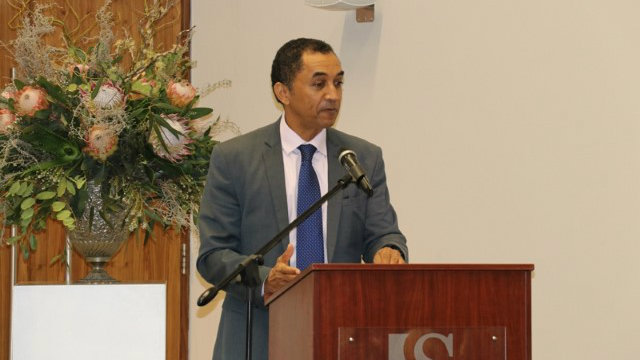In a world wrestling with challenging social and economic problems and increasing inequalities, university leaders and researchers gathered at the University of Stellenbosch, South Africa, to discuss how business schools and higher education can contribute to the wellbeing of everyone, embracing excluded groups.
The event, entitled The Contribution of Business Schools and Higher Education to Inclusive Development, marked the 50th anniversary of the University, and was jointly organised by our School of Management, the University of Stellenbosch Business School and the European Foundation for Management Development (19-21 April).
Exploring the issues of enabling inclusion and triggering societal transformation, as well as ensuring diversity and equality in higher education, a delegation from Bath and over seventy international researchers joined keynote speakers Baroness Janet Royall of Blaisdon, former Pro-Chancellor of the University of Bath; and Professor Derrick Swartz, the Vice Chancellor of Nelson Mandela Metropolitan University.
Professor Swartz linked the challenges facing HE to growing inequality as a result of particular forms of neo-liberal economics and political failure. He stressed the need for universities to develop an inter-generational social compact, new alliances with civil society and innovative and inclusive intellectual cultures.
Business must adapt to a new way of working
Baroness Royall took up the United Nation’s Sustainable Development Goals (SDGs), and said: “Too often we forget that the SDGs represent a universal agenda, which applies to all countries, rich and poor who have promised to ensure that no-one will be left behind in the implementation of the goals. Businesses in Europe as well as in Africa have to adapt to a new way of working, embracing a more sustainable model in order to safeguard the future of our world.
“This is where the role of so many in this room, those leading our business schools, is crucial. You are the innovators, the educators, the catalysts for a new way of working that your students and researchers will take into businesses new and old.”
The prestigious programme of speakers included Professor Veronica Hope Hailey, Dean of the University of Bath’s School of Management; the Vice Chancellor, Deputy Vice Chancellor and Director of the Business School at the University of Stellenbosch; and Professor Rajani Naidoo, Director of Bath’s International Centre for Higher Education Management (ICHEM).
“As much as helping its students to become future business leaders, the University’s School of Management is focused on its responsibility to transform society through education. ICHEM is world-renowned proof of that commitment” explained Professor Hope Hailey.
Professor Piet Naude, Director of the University of Stellenbosch Business School, spoke of different forms of exclusion linked to ethnicity and gender and how business schools could develop strategies for greater justice in South Africa.
Setting the scene for the conference, ICHEM Director, Professor Rajani Naidoo, said: “We live in a global environment with deepening social, economic and political fractures. These include an exponential growth in inequality, the return of absolute poverty and growing fault lines between those who have secure employment, those who work in precarious conditions and those who are excluded. Migration caused by war and poverty has led to large-scale suffering.”
A call for global collaboration
Professor Naidoo spoke of the imperative of global collaboration to respond to these challenges and the capacity of universities to ‘forge transnational synergies’. She outlined the barriers to this caused by obsessive competition between institutions, and proposed funding and policy measures to promote more sustainable developments in HE worldwide. In closing the conference, co-organiser Samantha Walbrugh Parshad reflected on the importance of the conference in building an interdisciplinary base for future collaboration.
The conference was featured on prime time South African news including interviews with Professors Naude and Naidoo. ICHEM PhD student, Mukhove Masutha, founder of Thusanani Foundation, gave television and newspaper interviews on his call for reform to university education funding for students from disadvantaged backgrounds in South Africa.
For more information please visit the conference website.

